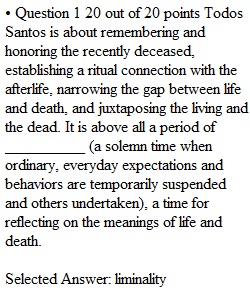


Q • Question 1 20 out of 20 points Todos Santos is about remembering and honoring the recently deceased, establishing a ritual connection with the afterlife, narrowing the gap between life and death, and juxtaposing the living and the dead. It is above all a period of __________ (a solemn time when ordinary, everyday expectations and behaviors are temporarily suspended and others undertaken), a time for reflecting on the meanings of life and death. • Question 2 20 out of 20 points Candomblé, santería, and vodou are three prominent examples of Afro–Latin religions that resulted from colonialism and _______ the process whereby different cultural traditions come into contact and merge in different ways to form novel ones. • Question 3 20 out of 20 points ________ ________ emerged in the 1960s, it was part of a broad movement from within the Catholic Church that sought to have an encounter between teachings of the Bible—especially the messages of social justice and equality—and the lived experience and reality of Latin American and Caribbean peoples. [hint: this is a two word response] • Question 4 20 out of 20 points In Haiti, the _____ are represented by Catholic saints and deities to such an extent that it might make sense to think of them as having double, complementary identities. Hence, the Virgin is equated with Elizi; Saint Patrick with Danbala, the serpent deity; and Saint Isidore, representing the peasant farmer, is identified with Azaka, the African deity representing cultivation and the farming way of life. • Question 5 20 out of 20 points The most important African influence in candomblé and _______ is and historically has been Yoruba—not a surprising fact because Yoruba-speaking peoples from West Africa, and specifically from what is now Nigeria and Benin, formed the last bulk of slaves transported to Brazil and Cuba.
View Related Questions